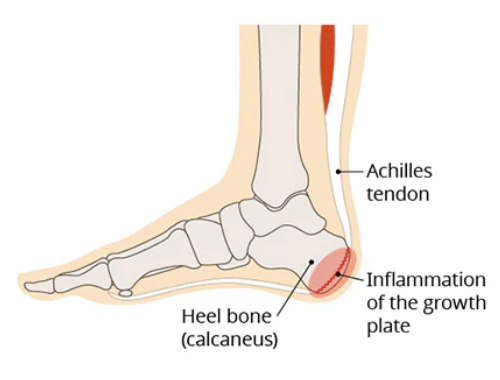For the safety of our patients and staff, our offices are closed today, Monday, February 23, 2026.

Sever’s Syndrome, also known as Sever’s disease, is primarily a childhood condition, affecting children between the ages of 8 and 14 who are undergoing rapid growth during early puberty. The syndrome is attributed to inflammation of the growth plate in the heel. During these growth spurts, the leg bones may outpace the muscles and tendons in growth, leading to tension in the heel’s growth plates. This tension manifests as symptoms such as pain, tenderness, and swelling in the heel, which tend to worsen with physical activities, particularly those involving running and jumping. The pain typically eases with rest.
Diagnosis of Sever’s Syndrome is generally made through a combination of medical history and physical examination, with imaging tests used occasionally to exclude other conditions. Factors increasing the risk of this condition include active participation in sports, a recent growth spurt, and, in some cases, overweight and obesity due to the added stress on the heel.
We’re here to help! Contact our friendly staff and connect with our expert doctors
Unlike many other inflammatory conditions, Sever's Syndrome may not always present with visible signs of inflammation such as redness or swelling around the heel area. This can sometimes make it harder to identify just by observation
Children with Sever's Syndrome often have tight muscles in their lower extremities, particularly the calf muscles. This tightness can contribute to the strain on the heel and exacerbate the condition
One of the most telltale symptoms is tenderness or pain when pressure is applied directly to the growth plate area on the heel. This is often a key indicator used in diagnosing the condition.
Pain in the heel bone, particularly noticeable at the end of physical activities like sports or exercise, is a common symptom. The pain usually subsides with rest
There may be occasional pain in the Achilles tendon, as it attaches to the area near the growth plate of the heel. This pain can be due to the increased tension and stress on the tendon
Children with Sever's Syndrome might experience stiffness in the heel area after sitting for a period and then standing up to walk. This stiffness usually eases as they continue to move
Limping is often observed, especially after getting up from a seated position following sports or exercise activities. This is due to the pain and stiffness in the heel, which temporarily affects normal walking
We’re here to help! Contact our friendly staff and connect with our expert doctors